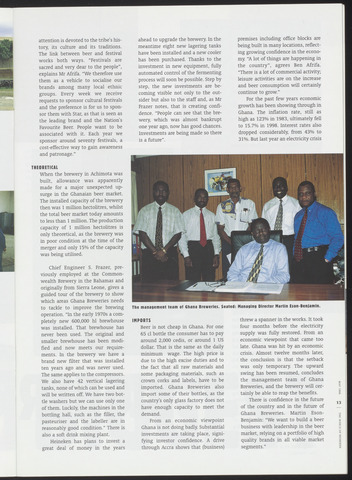attention is devoted to the tribe's his
tory, its culture and its traditions.
The link between beer and festival
works both ways. "Festivals are
sacred and very dear to the people",
explains Mr Afrifa. "We therefore use
them as a vehicle to socialise our
brands among many local ethnic
groups. Every week we receive
requests to sponsor cultural festivals
and the preference is for us to spon
sor them with Star, as that is seen as
the leading brand and the Nation's
Favourite Beer. People want to be
associated with it. Each year we
sponsor around seventy festivals, a
cost-effective way to gain awareness
and patronage."
THEORETICAL
When the brewery in Achimota was
built, allowance was apparently
made for a major unexpected up
surge in the Ghanaian beer market.
The installed capacity of the brewery
then was 1 million hectolitres, whilst
the total beer market today amounts
to less than 1 million. The production
capacity of 1 million hectolitres is
only theoretical, as the brewery was
in poor condition at the time of the
merger and only 15% of the capacity
was being utilised.
Chief Engineer S. Frazer, pre
viously employed at the Common
wealth Brewery in the Bahamas and
originally from Sierra Leone, gives a
guided tour of the brewery to show
which areas Ghana Breweries needs
to tackle to improve the brewing
operation. "In the early 1970s a com
pletely new 600,000 hi brewhouse
was installed. That brewhouse has
never been used. The original and
smaller brewhouse has been modi
fied and now meets our require
ments. In the brewery we have a
brand new filter that was installed
ten years ago and was never used.
The same applies to the compressors.
We also have 42 vertical lagering
tanks, none of which can be used and
will be written off. We have two bot
tle washers but we can use only one
of them. Luckily, the machines in the
bottling hall, such as the filler, the
pasteuriser and the labeller are in
reasonably good condition." There is
also a soft drink mixing plant.
Heineken has plans to invest a
great deal of money in the years
ahead to upgrade the brewery. In the
meantime eight new lagering tanks
have been installed and a new cooler
has been purchased. Thanks to the
investment in new equipment, fully
automated control of the fermenting
process will soon be possible. Step by
step, the new investments are be
coming visible not only to the out
sider but also to the staff and, as Mr
Frazer notes, that is creating confi
dence. "People can see that the bre
wery, which was almost bankrupt
one year ago, now has good chances.
Investments are being made so there
is a future".
premises including office blocks are
being built in many locations, reflect
ing growing confidence in the econo
my. "A lot of things are happening in
the country", agrees Ben Afrifa.
"There is a lot of commercial activity;
leisure activities are on the increase
and beer consumption will certainly
continue to grow."
For the past few years economic
growth has been showing through in
Ghana. The inflation rate, still as
high as 123% in 1983, ultimately fell
to 15.7% in 1998. Interest rates also
dropped considerably, from 43% to
31%. But last year an electricity crisis
The management team of Ghana Breweries. Seated: Managing Director Martin Eson-Benjamin
IMPORTS
Beer is not cheap in Ghana. For one
65 cl bottle the consumer has to pay
around 2,000 cedis, or around 1 US
dollar. That is the same as the daily
minimum wage. The high price is
due to the high excise duties and to
the fact that all raw materials and
some packaging materials, such as
crown corks and labels, have to be
imported. Ghana Breweries also
import some of their bottles, as the
country's only glass factory does not
have enough capacity to meet the
demand.
From an economic viewpoint
Ghana is not doing badly. Substantial
investments are taking place, signi
fying investor confidence. A drive
through Accra shows that (business)
threw a spanner in the works. It took
four months before the electricity
supply was fully restored. From an
economic viewpoint that came too
late. Ghana was hit by an economic
crisis. Almost twelve months later,
the conclusion is that the setback
was only temporary. The upward
swing has been resumed, concludes
the management team of Ghana
Breweries, and the brewery will cer
tainly be able to reap the benefits.
There is confidence in the future
of the country and in the future of
Ghana Breweries. Martin Eson-
Benjamin: "We want to build a beer
business with leadership in the beer
market, relying on a portfolio of high
quality brands in all viable market
segments."

